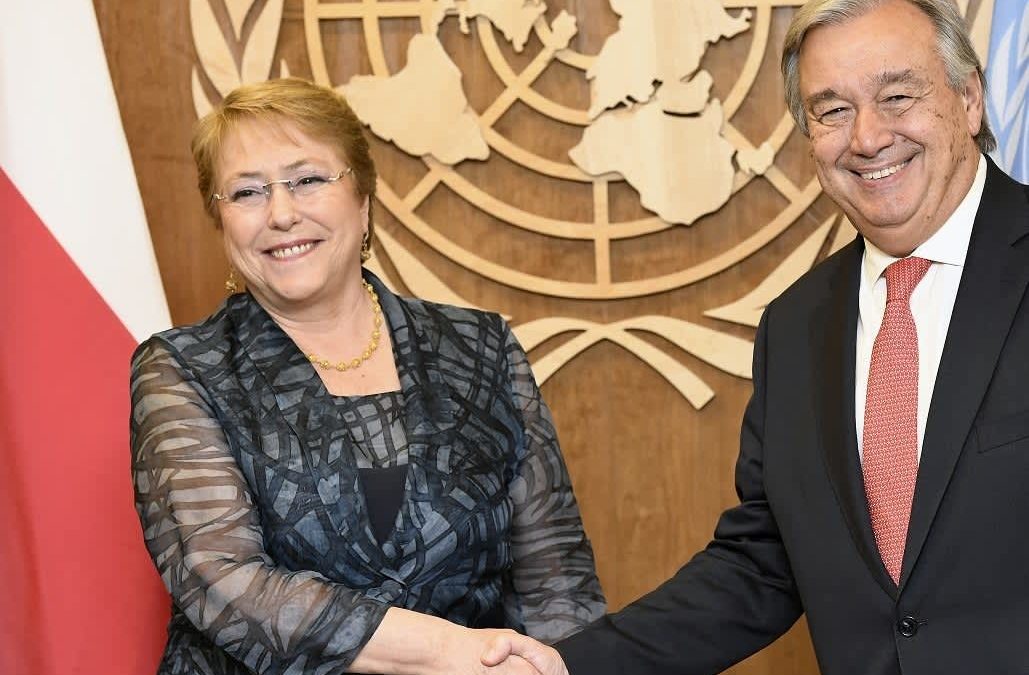Michelle Bachelet, twice president of Chile (2006–2010 and 2014–2018) and former head of UN Woman (2010–2013) was unanimously elected by the UN General Assembly as the new UN Office of the High Commissioner for Human Rights (OHCHR). For this reason, it seems appropriate to draw attention to her complex human rights record and her relationship to civil society.
The role of the OHCHR is to promote and protect the human rights that are guaranteed under international law and stipulated in the Universal Declaration of Human Rights of 1948. The office was established by the UN General Assembly on 20 December 1993 and it co-ordinates human rights activities throughout the UN system.
Bachelet arrives to the OHCHR in times of turmoil: former commissioner Zeid Ra’ad Al Hussein leaves after saying that “his voice would be silenced in an age when the United States and other world powers are retreating from their historical commitment to human rights.” In fact, the United States left the Human Rights Council—that works closely with the Office of the High Commissioner for Human Rights—accusing it of a “chronic anti-Israel bias.”
It is suspected that the move was motivated by the United States wanting to avoid “being called out on its own alleged human-rights abuses”. Al Hussein made a point of strongly criticizing governments when needed: “My job is not to defend governments, they can do that themselves, my job was to defend the rights of everyone else, individuals.” That’s why the former commissioner was considered a champion of human rights by civil society and social movements.
Bachelet is a former political prisoner under Pinochet’s dictatorship, and victim of torture. She is also the daughter of a constitutionalist Chilean Air Force General who refused to join the coup d’état against the Salvador Allende in 1973, and that died in imprisoned and tortured by their own former comrades of arms.
As a cabinet minister, first, and then as twice president of Chile, Bachelet has been considered a woman that broke the glass ceiling in Latin America, a region where patriarchal oppression is still a reality despite recent progress. Between her two mandates as president, Bachelet was the first executive officer of the new UN Woman entity.
Michelle Bachelet advanced progressive social and economic reforms in Chile, especially during her second mandate. Chile is one of the most developed countries in the Global South but suffering from inequalities that haven’t been reduced since the end of the dictatorship. The outcomes of these reforms are still to be seen, especially after a change in the political sign of the government with the election of the centre-right Sebastián Piñera.
Nevertheless, in terms of human rights, Bachelet’s record in Chile is mixed:
During her first mandate in office, the first Institute of Human Rights was created, as well as the Museum for Memory and Human Rights. These were overdue demands of the Chilean human rights movement, which emerged as a response to the State terrorism of Augusto Pinochet dictatorship (1973–1990).
On the other hand, human rights abuses continued against Chilean First Nations, especially the Mapuche people, in the south of the country. During her governments, police repression was common and an Anti-terrorism law from the dictatorship era was used against Mapuche activists. The structural issues of land ownership and First Nations sovereignty didn’t advance through Bachelet’s mandates, neither.
In what regards the criminals from the Pinochet-era, Bachelet finished her last mandate under fire because she didn’t close a special jail for former military before leaving. For the Human Rights movement, the existence of special jails with privileges is part of an impunity culture that should end.
Despite concerns regarding Bachelet’s record, we can only hope that she will bring the best of her background and her experience to the office of the U.N. High Commissioner for Human Rights. She has demonstrated in the past a great capacity to listen and engage with civil society.
Therefore, civil society and social movements have a key role on ensuring that the Office continues to be a watchdog of governments, by constructively engaging with Bachelet and pressing for a continuation of the bold and courageous work of Zeid Ra’ad Al Hussein.
By Sebastián Vielmas, Regional Working Group Officer with the Canadian Council for International Co-operation

